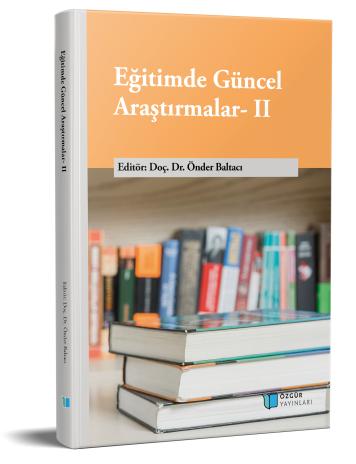
Sınıf Öğretmenlerinin Düşünme Stilleri ile Sınıf Yönetim Stilleri Arasındaki İlişkinin İncelenmesi
Şu kitabın bölümü:
Baltacı,
Ö.
(ed.)
2023.
Eğitimde Güncel Araştırmalar- II.
Özet
İnsanları diğer canlılardan ayıran en temel özelliklerden biri olan düşünme, 21 yy.ın da temel becerileri arasında yerini almaktadır. Düşünme becerisi tek düze bir beceri değil birden fazla düşünme stilini ifade eder. Kişiler düşünme stiline değil, düşünme stillerine sahiptirler. Düşünme stilleri insanların düşünürken kullanmayı tercih ettikleri yolları ifade ettiğinden öğretmenlerin sınıf yönetimi tercihlerinde de düşünme stilleri etkili olmaktadır.
Bu çalışmanın amacı, sınıf öğretmenlerinin düşünme stilleri ile sınıf yönetim stilleri arasındaki ilişkinin ortaya konmasıdır.
Araştırma ilişkisel tarama modelinde desenlenmiştir. Araştırmanın örneklemini Kocaeli ilinde 2018-2019 eğitim öğretim yılında görev yapan 522 sınıf öğretmeni oluşturmaktadır.
Araştırmada veriler, sınıf öğretmenlerinin düşünme stillerini belirlemek için Sternberg ve Wagner (1992) tarafından geliştirilen ve Buluş (2006) tarafından Türkçeye uyarlanan“Düşünme Stilleri Ölçeği”, sınıf yönetim stillerini belirlemek için ise Bosworth (1997) tarafından geliştirilen ve Aktan ve Sezer (2018) tarafından Türkçeye uyarlanan “Sınıf Yönetim Stilleri Ölçeği” ile toplanmıştır. Araştırmada elde edilen veriler SPSS 20.0 paket programı ile çözümlenmiştir. Ölçeklerden elde edilen puanlar normal dağıldığından parametrik testlerden ilişkisiz örneklemler için t-testi, tek yönlü varyans analizi (One-way ANOVA) ve ilişki testi için Pearson korelasyon katsayı değeri kullanılmıştır.
Araştırma sonucunda, sınıf öğretmenlerinin sınıf yönetim stillerinden en fazla yetkeci yönetim stilini en az ilgisiz sınıf yönetimi stilini, düşünme stillerinde ise en fazla hiyerarşik düşünme stilini en az ise muhafazakâr düşünme stilini tercih ettikleri ortaya çıkmıştır. Baskıcı düşünme stili ile yürütmeci ve muhafazakâr düşünme stilleri arasında pozitif yönde çok düşük düzeyde, yargı düşünme stili ile negatif yönde çok düşük düzeyde anlamlı ilişki bulunmuştur. Yetkeci sınıf yönetim stili ile yasama, yargı, hiyerarşik, liberal düşünme stilleri arasında pozitif yönde düşük düzeyde, global düşünme stili ile negatif yönde düşük düzeyde ilişki bulunmuştur. Serbest sınıf yönetim stili ile anarşik ve global düşünme stili arasında pozitif yönde düşük düzeyde anlamlı ilişki vardır. İlgisiz sınıf yönetim stili ile oligarşik, global, dışsal düşünme stilleri arasında pozitif yönde çok düşük düzeyde, yasama düşünme stili ile negatif yönde düşük düzeyde ilişki tespit edilmiştir.

